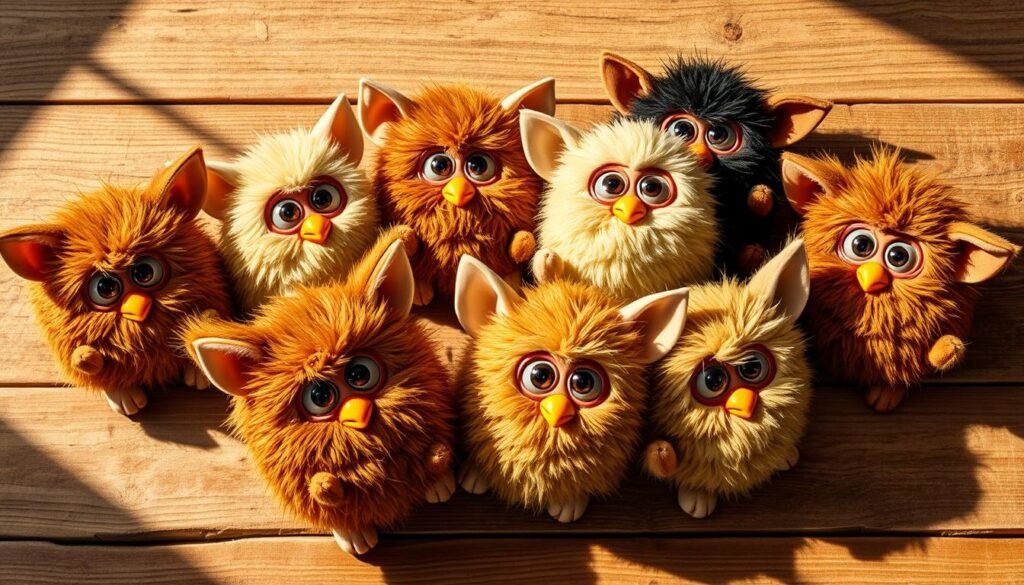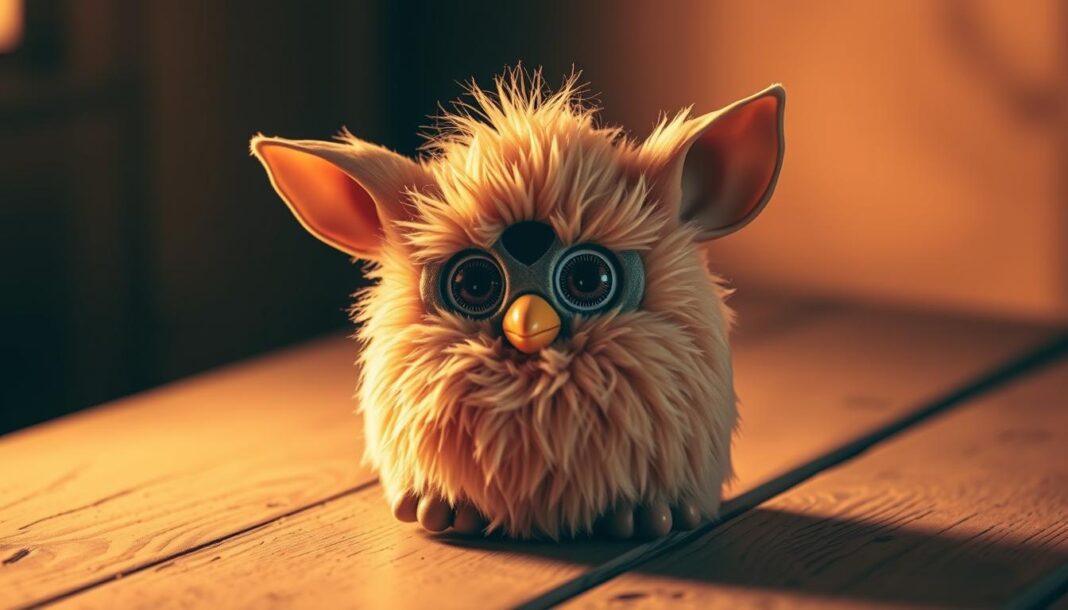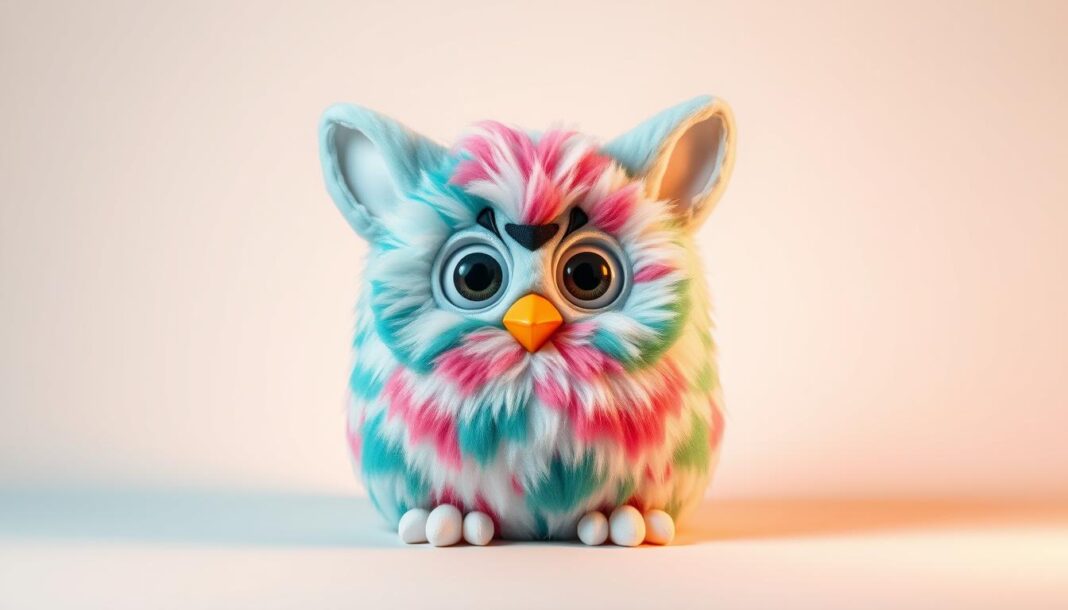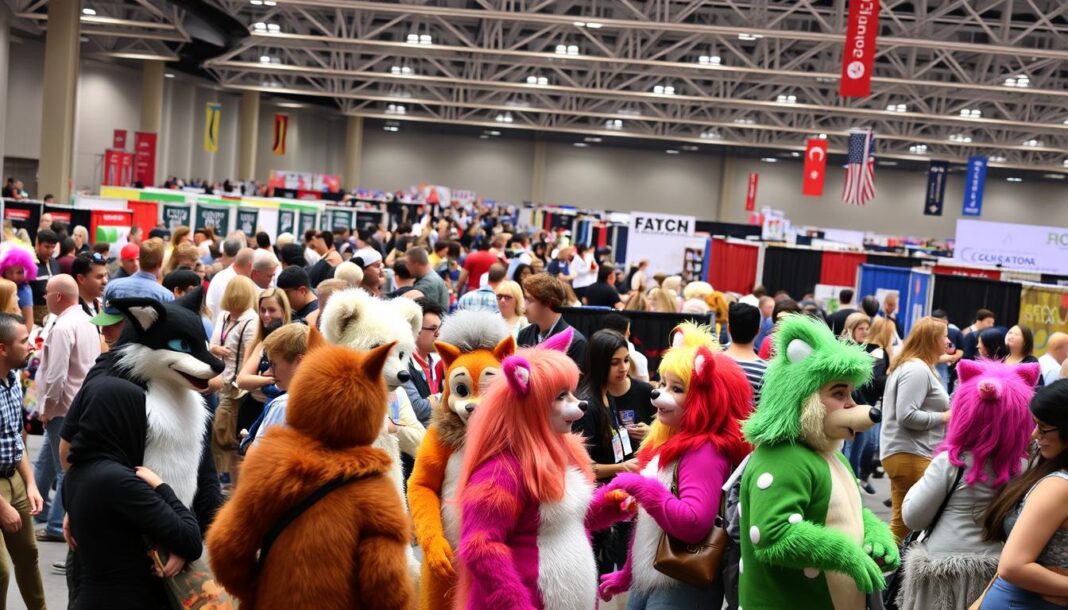Collectors and nostalgic fans are rediscovering the charm of Furbies, making these interactive toys highly sought after. The market shows extreme price differences—common models sell for under $100, while rare editions can fetch thousands.
A 1998 Original Furby Tiger recently sold for $365, setting a baseline for vintage models. Meanwhile, the ultra-rare Millennium Edition holds the record at over $4,500. Modern releases like the Furby Connect retail around $69.99 but lack the appreciation potential of older generations.
Condition, packaging, and special features dramatically impact value. This guide helps sellers and collectors assess true market prices using verified data from Furby Toy Shop’s appraisal experts.
Key Takeaways
- Original 1998 Furbies start at $300+ in good condition
- Millennium Edition holds the record sale above $4,500
- Modern Furbies retail under $70 but don’t appreciate like vintage
- Rarity and packaging create massive price differences
- Special editions and prototypes command premium prices
The Furby Phenomenon: From 90s Craze to Collector’s Dream
In 1998, a fluffy revolution began when Tiger Electronics unleashed the first Furby onto toy store shelves. Priced at $35, these interactive toys captivated kids with their “Furbish” language and lifelike reactions. By 2001, over 40 million units had sold, cementing their status as a cultural artifact of the late 90s.

The Birth of Furby and Its Rise to Fame
The original 1998 model featured infrared sensors and a unique ability to “learn” English over time. Misconceptions about its tech even led to bans at the NSA and Pentagon. Collectors now hunt for prototypes like the rare hairless Furby, valuing their historical significance.
Evolution of Furbies: Generations and Features
Each reboot introduced cutting-edge upgrades. The 2005 Emoto-Tronic line added voice recognition, while 2016 models integrated Bluetooth for app control. Yet, vintage 1998–2001 Furbies remain the most sought-after.
| Generation | Key Feature | Collectibility |
|---|---|---|
| 1998 Original | Furbish language, mechanical movements | High ($$$) |
| 2005 Emoto-Tronic | Voice recognition, LCD eyes | Medium ($$) |
| 2016 Connect | Bluetooth, app integration | Low ($) |
Like Tamagotchis, Furbies redefined interactive toys. But their journey from plaything to collector’s dream proves rarity and nostalgia drive value more than tech.
How Much Is a Furby Worth Today? Key Factors That Determine Value
Original packaging can multiply a Furby’s value by 60%, as recent auctions prove. Three elements separate ordinary toys from coveted collectibles: scarcity, physical state, and presentation.
Rarity and Limited Editions
Store exclusives dominate the rarity hierarchy. Only 500 Royal Furbies with blue-green eyes were produced, now valued at $2,000+.
Promotional models like the Hi-C contest edition require authentication. Their special editions status often doubles standard prices.
Condition: Mint vs. Well-Loved
Mint means no discoloration, working sensors, and intact tags. A flawless Special Furby Angel sold for $800 last quarter.
Motor issues slash value by 30-50%. Emoto-Tronic models demand functional voice recognition to maintain premium pricing.
| Packaging Tier | Value Premium | Example |
|---|---|---|
| Sealed with inserts | 40-60% | Kids Cuisine Furby ($520) |
| Opened with box | 20-30% | 1998 Tiger ($365) |
| Loose | Base value | Common 2005 models ($75) |
Professional grading services now certify vintage Furbies. This trend mirrors action figure markets, as seen in original Furby appraisals.
Spotlight on Rare and Valuable Furbies
Among collectors, certain Furbies stand out as legendary treasures, commanding jaw-dropping prices. Limited editions and promotional variants dominate auction blocks, with market value often exceeding expectations. Here’s a deep dive into the most coveted models.
Millennium Edition and High-Value Releases
The 2000 Millennium Edition reigns supreme, with one furby sold for $4,500 in 2022. Only 10,000 were made, featuring metallic plating and a Y2K-themed box. Even rarer is the FAO Schwarz Swarovski crystal version—just five exist, valued at $100k+.
Other rare special releases include:
- Chicago Cubs Edition: $400+ for 2000 Wrigley Field promo units
- Wizard Furby: $300+ for its embroidered cloak and hat
- Special Furby Angel: $800+ for mint-condition holiday variants
Promotional and Store-Exclusive Furbies
Retail collaborations created instant collectibles. Target’s Jester Furby (72k produced) now sells for $250+, while the Hi-C contest edition requires certificates to verify authenticity.
| Model | Rarity | Recent Sale Price |
|---|---|---|
| Millennium Edition | 10,000 made | $4,500 |
| Swarovski Furby | 5 made | $100,000+ |
| Long Furby (Custom) | Artist-made | $600+ (200% surge) |
Custom creations like snake-like “Long Furby” hybrids sparked 58-bid eBay wars in 2023. Meanwhile, prototypes from Heritage Auctions reveal unreleased designs, further fueling demand for rare special finds.
Furby Generations: Which Ones Are Worth the Most?
Not all Furbies age equally—some become treasures while others remain playthings. The original Furby from 1998 dominates auctions, while 2005’s voice-activated models follow at half the price. Modern releases struggle to gain collector traction despite advanced tech.
1998 Original vs. 2005 Emoto-Tronic Models
First-gen Furbies (1998-2003) use mechanical sensors that withstand years of use. Sealed units now reach $900, as confirmed by original Furby toy appraisals.
Second-gen Emoto-Tronic models face preservation issues. Their voice recognition systems often fail, dropping loose units to $75-150. As one collector notes:
“2005 Furbies are ticking time bombs—when the voice chip dies, so does the value.”
| Feature | 1998 Original | 2005 Emoto-Tronic |
|---|---|---|
| Core Mechanism | Infrared sensors | Voice recognition |
| Mint Value | $300-$900 | $200-$300 |
| Annual Appreciation | 15% | 5% |
Modern Furbies: Are They Collectible?
2016’s Bluetooth-enabled Connect models retail for $69 but resell below MSRP. Only special editions like the 2021 Pride prototypes show potential.
The customization community boosts modern toys through artistic modifications. Snake-like “Long Furbies” sell for $600+, proving creativity outweighs original tech in some cases.
- Furby Boom (2012): App integration adds novelty but not value
- Furby Babies (2001): Market rejection (-20% value year-over-year)
- 2020s Releases: Predicted to underperform vintage models long-term
Market Trends: Where Furby Prices Are Heading
Auction houses report unprecedented demand for vintage Furbies, creating a seller’s market. The 90s toy collectibles sector grew 10.1% annually since 2022, with Furbies outperforming the S&P 500 since 2018. This surge reflects broader trends in nostalgia-driven investments.
Recent Sales and Record-Breaking Auctions
2023 Q2 data shows a 22% year-over-year increase for original models. The 35-50 age group dominates purchases (78%), often paying premiums for childhood memorabilia. Southeast Asia shows 40% demand growth, indicating expanding market potential.
| Model | 2021 Avg Price | 2023 Avg Price | Growth |
|---|---|---|---|
| 1998 Original (Mint) | $275 | $420 | 53% |
| Millennium Edition | $2,800 | $4,100 | 46% |
| Special Furby Angel | $550 | $790 | 44% |
TikTok unboxing videos caused a 300% search increase, demonstrating social media’s impact on value. Unlike Beanie Babies, Furbies maintain tech appeal beyond pure nostalgia—a key differentiation in long-term collectibles potential.
The Role of Nostalgia in Driving Demand
Millennial buyers seek tangible connections to their childhood, with working models commanding 30% premiums. Preservation advances now extend electronic collectibles’ lifespan, supporting time-tested investment theses.
2024 forecasts predict 18-25% rarity premium increases. However, 3D printing poses reproduction risks—authenticators report a 15% rise in counterfeit attempts since 2021. As one Heritage Auctions specialist notes:
“The Furby market isn’t speculative—it’s driven by genuine scarcity and generational attachment. That creates sustainable value.”
With the global collectibles market projected to reach $35.3B by 2032, Furbies remain standout performers. Their dual appeal as both tech artifacts and childhood icons positions them uniquely in the market landscape.
Buying and Selling Furbies: Tips for Smart Transactions
Smart collectors know the right platform makes all the difference when trading Furbies. With eBay handling 68% of secondary market sales, understanding platform strengths is key to getting the best way to move your collectible.
Best Platforms to Sell Your Furby
eBay remains the top choice for rare finds, while Mercari suits common models. Specialty auction houses like Heritage Auctions work best for special editions worth a lot money.
Key platform differences:
- eBay: 12% profit margin advantage for vintage units
- Mercari: Faster sales for post-2005 models
- Local pawn shops: Typically offer 40% below market value
How to Spot a Good Deal When Buying
Authentic Furbies should have original tags and unaltered eye mechanisms. Watch for way too perfect paint jobs—a sign of restoration that cuts value by half.
| Red Flag | Detection Tip | Value Impact |
|---|---|---|
| Repainted eyes | Check for brush marks under magnification | -50% |
| Aftermarket packaging | Compare UPC codes to verified Furby sales | -75% |
| Non-working sensors | Request video demonstration | -30% |
For international deals, always request notarized provenance documents. Customs often holds shipments lacking proper toy certification.
“Insure anything over $500—these electronics need climate-controlled transport. One collector lost $2,300 when batteries leaked during transit.”
Emerging NFT authentication trials could revolutionize the home collectibles market. Some platforms now offer blockchain-backed certificates for high-end transactions.
Preserving Your Furby’s Value: Care and Storage Tips
Maintaining a Furby’s collectible status requires strategic preservation. Proper care prevents deterioration, ensuring long-term value retention. Whether displayed or stored, these techniques safeguard your investment.
Keeping Your Furby in Mint Condition
UV exposure degrades fur and sensors, reducing condition by 3% monthly. Ideal environments maintain 68°F with 45% humidity. Silica gel packets combat moisture damage in storage.
Cleaning demands precision:
- Microfiber cloths gently remove dust without abrasion
- Compressed air clears sensor crevices
- Battery removal prevents electrical corrosion
For discolored fur, professional conservators use light-reversal techniques. DIY repairs often lower value—82% of collectors prefer original parts preservation.
Display vs. Storage: What Collectors Prefer
Museum-grade acrylic cases block 99% UV rays while showcasing original packaging. DIY solutions risk warping or static damage. Climate-controlled storage suits rare editions.
| Option | Cost | Protection Level |
|---|---|---|
| Professional Display Case | $120+ | High |
| Archival Storage Box | $25 | Medium |
| Open Shelf Display | $0 | Low |
“Insure collections over $10k—disaster preparedness separates casual owners from serious collectors.”
Professional appraisals update insurance valuations annually. Specialized services cost $150–$500 but justify premiums for high-value items.
The Future of Furby Collecting: What to Watch For
The collectibles market is evolving, with Furbies gaining new relevance in digital authentication spaces. Blockchain systems now verify rare editions, while AR apps let buyers inspect value remotely. These tech factors could redefine trading in coming years.
Gen Z’s influence is reshaping demand. Custom “Long Furbies” thrive on social media, blending art with nostalgia. Meanwhile, museums now display 12 models as cultural artifacts, cementing their status beyond toys.
Emerging markets like Brazil show 120% growth, signaling global expansion. For savvy collectors, tracking Furby price trends and 3D-printing detection tools will be key. The future favors those who adapt early.


